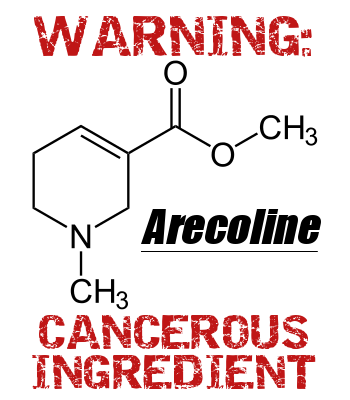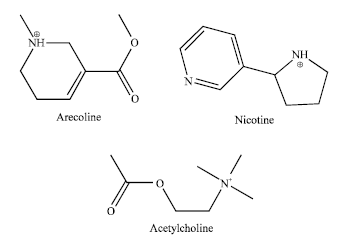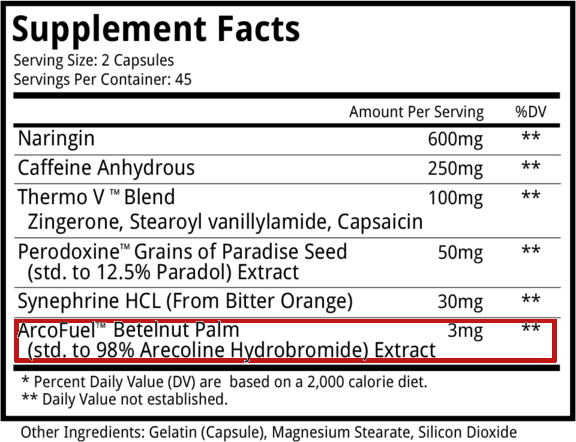2017 Update: We urge caution over an "international" version of Insane Labz Psychotic, which was recalled by Health Canada. Curiously, they misspelled arecoline as "aroline".

WARNING: Do your research before taking any supplements with this inside
The sports nutrition industry is always pushing the limits in its constant quest to find the "next major stimulant". This article discusses one such compound, and the warnings that go along with it.
While we honestly believe that you should be free to choose what you put into your body, we also think that you must be aware of the research behind the ingredients inside.
This article is about one such ingredient: arecoline, also known as betel nut extract or areca nut extract. It's now marketed as a trademarked ingredient named ArcoFuel, but the 2016 update is that it's already going off the market, which we're happy about.
Few people are discussing the truth behind this ingredient, and that's why we're here.
Cancer-causing supplement ingredient?
You've probably never heard of betel nut, or its synthetic derivative arecoline. But if you're a supplement user, you should be hearing about it, given that it's well-established as a carcinogen[1] and is making its way into the sports nutrition industry.
The story starts with betel nut, whose background we'll discuss before getting into the dangers of the arecoline compound itself. But to give you an idea of where we're going here, the arecoline in betel nut is akin to the nicotine in tobacco -- both in terms of the benefits and the nasty side effects.
This is why you need to do your homework and think long and hard before jumping on any supplements with this stuff in it.
So What Is Betel Nut / Areca Nut?

The detriment of betel nut is beyond well-documented. This image shows the stained teeth of a regular betel chewer in Burma. Do a Google search for Betel Nut Cancer if you want to see how bad it can truly get. Courtesy Wikimedia Commons.
Although virtually unknown in the United States, betel (or areca) nut is widely used throughout the rest of the world in a way similar to chewing tobacco. It's most prevalent in Asia, where it's been used for hundreds of years.[2]
Despite this long history of use, it's known to be quite dangerous, putting users at serious risk of oral cancer and more.[2] While often combined with tobacco, studies have shown that areca nut by itself is prone to causing oral submucous fibrosis, a condition that often progresses to malignant oral cancer.
Some may try to blame this on the tobacco it's frequently mixed with, but similar rates of cancer have also been seen in countries where the preparation typically does not include tobacco.[3]
A carcinogenic nut with carcinogenic constituents
The dangers of this plant cannot be understated.
The arecoline in betel nut is akin to the nicotine in tobacco
In 2004, The International Agency for Research on Cancer (IARC) published an extremely well-developed research paper on the matter, "Betel Quid and Areca-Nut Chewing", where they mention the word "cancer" 716 times, "carcinogen" 109 times, "tumor" or "tumour" 179 times, and "carcinoma" 209 times.[2] It cites literally hundreds of sources, and also mentions "arecoline" 242 times, so they're not just talking about betel nut here.
Based on the overwhelming amount of evidence, the World Health Organization officially recognizes betel-quid and areca nut as carcinogens.[4] And while it's not illegal to sell in the United States, the Natural Medicines Comprehensive Database (widely used by pharmacists to research drug interactions and dangers) lists it as "likely unsafe".[4]
The FDA has an important alert on products that contain it, and lists it as unsafe for chewing or eating, placing it in its "Poisonous Plant Database".[5,6]
It also rates quite high on the FDA's "Rankings of Possible Toxic Hazards of Dietary Supplements Compared to Other Natural and Synthetic Substances,"[7] as given in a 1999 testimony by a Biochemistry and Molecular Biologist PhD team from the University of California Berkeley.
Not just oral cancer
Meanwhile, it clearly creates more devastation than just oral / lung cancer for those who chew it: research has showed users having increased rates of stomach cancer,[8] liver cancer,[9] and cervical cancer[10] too. It is clearly not just a "local" or topical danger -- the cervical cancer study even goes on to conclude "That the mutagenic changes at cellular level are associated with prolonged use of betel quid is suggested."[10]
Fair enough to say that betel nut and its arecoline constituent can mess you up for good.
All Known Studies showing Arecoline Side Effects and Toxicity
Since this article was originally written, it's been consistently attacked by sponsors and representatives of brands who still wish to use it.
In response, here's a more complete list of studies demonstrating the extremely toxic potential of arecoline:
- Arecoline-induced changes of poly-ADP-ribosylation of cellular proteins and its influence on chromatin organization.
- Arecoline-induced growth arrest and p21WAF1 expression are dependent on p53 in rat hepatocytes
- Synergistic effects of nicotine on arecoline-induced cytotoxicity in human buccal mucosal fibroblasts.
- The induction of prostaglandin E2 production, interleukin-6 production, cell cycle arrest, and cytotoxicity in primary oral keratinocytes and KB cancer cells by areca nut ingredients is differentially regulated by MEK/ERK activation.
- Effects of arecoline in relaxing human umbilical vessels and inhibiting endothelial cell growth.
- Characterization of arecoline-induced effects on cytotoxicity in normal human gingival fibroblasts by global gene expression profiling.
- A metabolomic approach to the metabolism of the areca nut alkaloids arecoline and arecaidine in the mouse.
- Immunosuppression, hepatotoxicity and depression of antioxidant status by arecoline in albino mice.
- Arecoline cytotoxicity on human oral mucosal fibroblasts related to cellular thiol and esterase activities.
- In vitro effects of arecoline on sperm motility and cyclooxygenase-2 expression.
- Arecoline is cytotoxic for human endothelial cells
- Effects of arecoline on hepatic cytochrome P450 activity and oxidative stress.
- The hepatotoxicity and testicular toxicity induced by arecoline in mice and protective effects of vitamins C and E.
Seen enough yet? If not, then go ahead and trash your body and testicles -- but two years later, our position remains: arecoline belongs nowhere near a healthy body.
How Did This Wind Up In Supplements?
Betel nut is a stimulant -- chewing it produces a temporary feeling of energy, euphoria, and well-being, likely due to the alkaloid content triggering the production of adrenaline in the body. It may also suppress appetite.[11]
If you've ever researched or used nicotine, these effects will all sound familiar. And for good reason: compare the two compounds and see that they're similar enough to both activate various acetylcholine receptors:

Arecoline and Nicotine are structured similarly enough that they both bind to certain acetylcholine receptors, eliciting quite similar effects (both positive and negative). Image courtesy Research Journal of Medicinal Plant.[12]
The active principle of A. catechu is an alkaloid, arecoline, which is considered to be the major constituent responsible for the toxicity...
Arecoline, like nicotine, binds to certain receptors for acetylcholine.[12]
Given these things, of course it's going to catch the eye of companies that manufacture fat burners and pre workouts. And it's not exactly an obscure herbal ingredient dug out of the depths of a jungle -- it's the fourth most frequently used psychoactive substance in the world, with an estimated 600 million users worldwide![11]
So it was basically only a matter of time until this happened - someone essentially putting a nicotine alternative into a supplement.
Of course, with that comes the monstrous track record of carcinogenic activity, addiction, and the fact that ingestion in supplement form basically has almost no body of scientific study as of yet.
Dangerously addictive compound: turning you into a real stim-junkie
For a manufacturer who's decided to cross that ethical line, there's also a far darker appeal of betel nut -- it's highly addictive, almost as much as nicotine.[13,14]
After all, there's a reason why so many people in Asia get hooked on this stuff for life, to the point that they keep chewing it even after it has stained their teeth a permanent red or black!
Arecoline hydrobromide in supplements

This is what you're looking out for on the label. ArcoFuel is labeled as "Betelnut Palm (std. to 98% Arecoline Hydrobromide) Extract. Pictured is Dynamik Muscle's Eviscerate label.
What we're seeing so far in these supplements is not pure betel nut or leaf, but arecoline hydrobromide. This is most likely a synthetic formulation that's actually been used for medical testing for some time and has shown some promise in the treatment of Alzheimer's, though it is not currently a recommended drug for that purpose.[15]
And once again, the addiction effect doesn't just go for betel nut, it goes for arecoline hydrobromide itself: it's been shown to have an addictive action very similar to that of nicotine - and we've known this since 1945![16]
Unfortunately, the synthetic formulation doesn't seem to remove the cancer risk either -- mouse studies indicate a high risk taking it in this way as well.[1]
So even though this ingredient will have some benefits that dieters like, it simply isn't worth the risk of an earlier death or cancer. It's that simple.
The supplements in question
Right now, it's not included in many supplements -- the most prominent to date being:
- LGI Boosted
- LGI Fully Loaded Amplified
- Insane Labz Psychotic ("International" version recalled by Health Canada in 2017)
-
Steel Supplements Amped-AF (as of January 2018, it is now reformulated).
Inside, they were calling it One3², which is likely a combination of arecoline, cymbidium goeringii, and higenamine in an effort to recreate previously-banned PEA-backboned stimulatory compounds.
2016 Update: Several brands removed this ingredient from their products!
The good news is that Kai Greene and his team at Dynamik Muscle no longer include it in their new Kai Greene pre workout Savage Roar and their fat burner, Eviscerate. They've replaced it with something known as Orchilean, which we're investigating further.
In addition, Blackstone Labs Dust V2 also reformulated away from it. Their label originally spelled it as Acofeul, AcoFuel, and ArcoFuel after typos were fixed.
Speaking of interesting misspellings, in 2017, Insane Labz Psychotic was recalled by Health Canada, and it spelled the ingredient as "aroline". Arcostim is the trade name of the ingredient used.
We wonder how why the one misspelling on the product label was also the most toxic ingredient. Probably just an oversight though, right?
While we're not accusing anyone plotting this out as an intentional business plan, we're deeply concerned about a successful product from a big-name manufacturer legitimizing the inclusion of this stuff in a wider range of supplements.
There is an ongoing "arms race" in the fat burner and pre workout market, and this is simply not a good turn of events.
If you read this article, look at the references, and choose to use it, then that's your decision. Where we truly had a problem is when mainstream celebrity names were used to sell a not-so-mainstream ingredient -- and NOBODY out there is mentioning that it could be carcinogenic because they failed to do the research.
"But the doses are low!"
The argument seen in discussion forums from the few supporters of arecoline in supplements basically amounts to "But the doses in these supplements are low, you're extrapolating data!"
To respond to that, go ahead and open up the IARC Research PDF[2] and do a search (using Ctrl-F) for 1 mg (with a space).
Inside, you'll find data on mice studies that went terribly wrong with just 1mg doses. For instance:
Groups of 8–20 female and 16–35 male Swiss mice, 6 weeks of age, were given 1 mg arecoline hydrochloride (in 0.1 mL distilled water) daily by gavage on 5 days a week, either alone or in combination with potassium nitrate (KNO3) (1 mg daily), or KNO3 with slaked lime (1 mg daily); controls were either untreated or received KNO3 and lime.
Treatment was continued for up to 25 months. A total of 15/35 (43%) males given arecoline alone developed tumours (8/18 between 12 and 18 months and 7/17 between 19 and 25 months) compared with 1/20 untreated males. Of the 15 tumours in the arecoline group, eight were liver haemangiomas, four were lung adenocarcinomas and three were squamous-cell carcinomas of the stomach.[2]
(emphasis ours)
This data is based upon a study performed in 1984. The data shown in the IARC paper[2] is explained more fully than the study's abstract on Pubmed.[17]
I know we're not mice and 1mg is more to them than us, but realize that at full doses of some of the products out there, you'd be getting 12mg of arecoline! 43% of the rats got cancer! That's nearly a coin flip!!!
At some point, we're no longer "extrapolating" data very much. This stuff is a serious hazard at any dose, for any period of time.
Long considered as an alternative to other "aggressive" PEA-backboned stimulants
In speaking to other manufacturers, after the FDA sent out warning letters and scared the industry away from other stimulants (including "the KING" of workout stims), arecoline was an ingredient considered by several brands. And they all turned it down, knowing the fiasco that it could cause. Until now.
An ingredient only Driven Sports could love
In fact, one company did try to launch it back in 2009.[18] That company would be none other than Driven Sports, the same guys who added a methamphetamine analogue to their CRAZE pre workout supplement.[19] Their arecoline-based supplement, "Adrenalean", thankfully mysteriously disappeared from the market before doing too much damage.
To put this into perspective: you know an ingredient is seriously bad news when Matt Cahill (of Driven Sports) has a change of heart, deciding not to sell it.
Fact is, it's definitely a struggle to stand out in an overcrowded fat burner and pre workout market, and the sales temptation of something like this (combined with uninformed users) may have been far too great.
We can't stop a company from launching a product, but we can stop consumers from being uninformed.
Labeled as a carcinogen in California
There are a couple of other legal issues with the inclusion of arecoline hydrobromide in products.
The state of California also requires areca nut products and "betel quid without tobacco" to be listed as known carcinogens.[20] We're not sure if that goes for the synthetic arecoline itself, but California's EPA most likely won't take too kindly to this once they see it.
The existing LGI and Blackstone products don't seem to be labeled that way.
In addition, technically the label is a bit out of compliance with FDA rules, since you can't list arecoline as a synthetic salt, but that's splitting hairs compared to everything else here.
Risky Business
We don't pretend to know what these brands were thinking when they included Arecoline Hydrobromide (from Areca catechu Seed) or in their products. They may just be looking at it as a popular stimulant that's underused in fitness products thus far, but failed to dig deep enough into the research.
These are underground brands, and to an extent, they have a knowledgeable and underground userbase who are willing to use higher-risk supplements. As long as it's not on celebrity products, we can deal with it so long as this research can stay published here.
However, the abundance of bad news against the ingredient simply doesn't make it worth the risk to us. If you read this page and the references and disagree, then by all means go for it - but we're not touching the stuff ourselves.
With something that has such a potent track record for causing cancer, any absence of evidence is definitely not the evidence of absence. Yet we think there's plenty of evidence against against this one, and urge you to really think hard and do your homework before jumping in.
Bodybuilding.com Quickly Reversed Stance
Bodybuilding.com carried a few products containing arecoline... . for about a day. Their "Compliance Team" is traditionally known as one of the most strict in the industry, and once they actually reviewed it, it seems to have been quickly pulled.
Before that decision, however, we were greatly disappointed that a quality discussion forum thread regarding this article has been closed down,[21] despite a lack of any trolling, name-calling, or rule-breaking behavior.
This is the second such BB.com forum thread that was closed on the matter.[22]


Comments and Discussion (Powered by the PricePlow Forum)